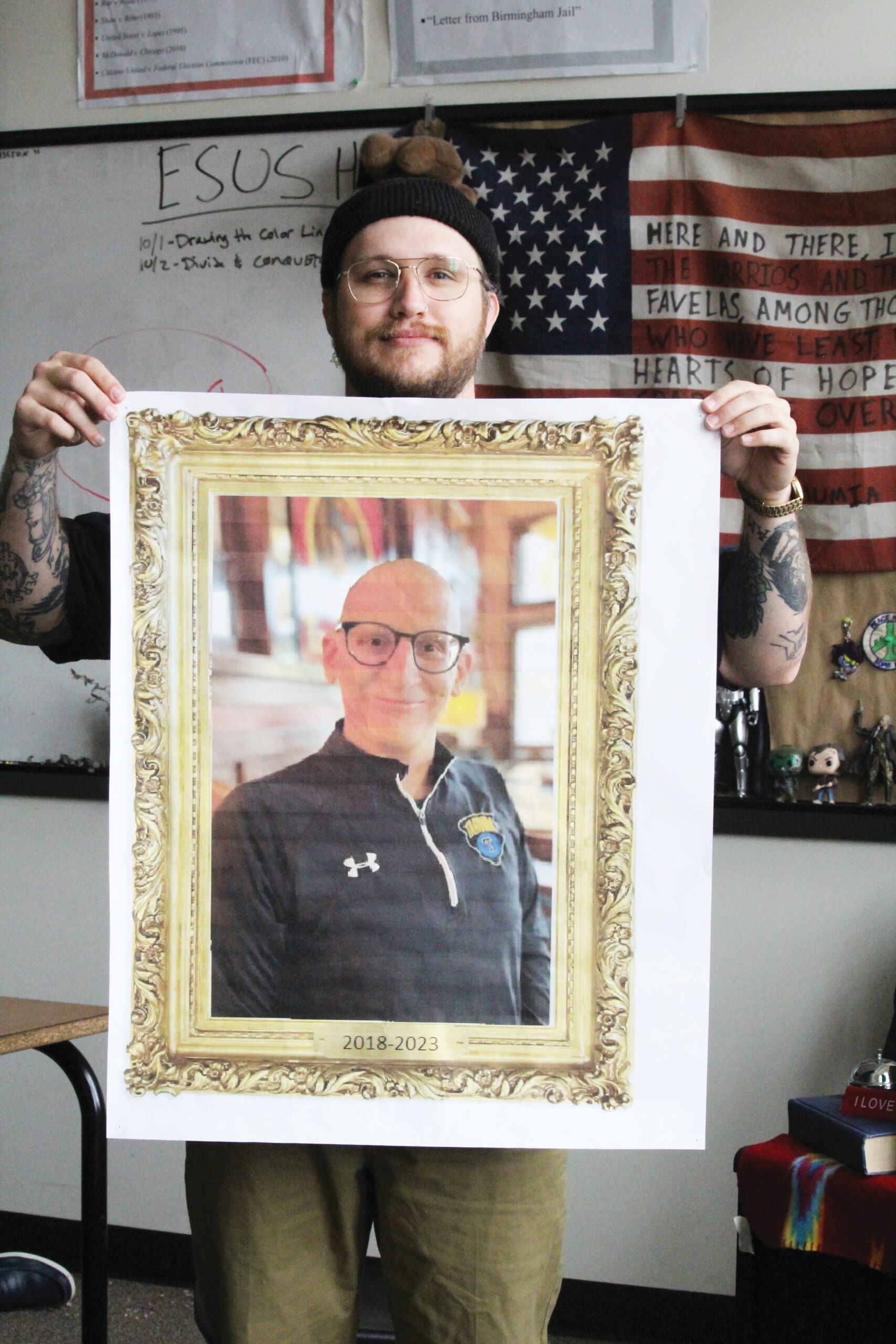
Many wouldn’t hesitate to say that Amanda Schwartz was the heart of Roosevelt High School. David Grosskopf, an LA teacher and department chair at Roosevelt, describes her as an absolute force “of honesty, thoughtfulness, empathy, and heart.” Grosskopf says “she managed to support and connect with individual students and colleagues with tenderness and care while also engaging school systems and culture to battle the larger harms she witnessed as a healer and listener in our community.”
Schwartz has been a nurse for 15 years. She was part of Roosevelt for three of those years, from September 2017 to August 2020. Many students follow her Instagram account, where she officially said goodbye to the Roosevelt community last year in an emotional video.
Today, Schwartz works in another school district, juggling a combination of working both at the school and as a sexual assault nurse examiner (SANE) while pursuing a 3 year Ph.D. program at UW to become a psychiatric nurse practitioner. With her education, Schwartz plans to “provide psychiatric care to adolescents and fill a much-needed gap in our local healthcare.”
The last nine months of quarantine has affected Schwartz’s new job as well. The online format of school has made it difficult to interact and make connections with patients and colleagues. Fortunately, Schwartz says that “the school I’m at is incredible. It’s a very student focused, supportive environment. I’m still learning about the school, but it seems to be very consistent with my values.”
And yet, Roosevelt students miss Schwartz. Lucinda Guthrie, a sophomore at RHS, says, “Nurse Amanda meant so much to me. I was assigned by my doctor to eat lunch with her every day and was nervous to do so but she made me feel comfortable and safe. Nurse Amanda also stood up against any kind of prejudice each and every single day and inspired all of the kids who met her.”
Without a doubt, Schwartz left a lasting impact on Roosevelt High School. Some of her legacies include Athletes as Leaders (AAL), the RHS Suicide Prevention Team (RSPT), and the Gender Diversity Club.
AAL is designed to teach young athletes about healthy relationships and ending sexual violence. These programs are traditionally meant to be taught in a sports team environment, but ASR tried to adapt the program to a classroom environment as well.
AAL took a lot of persistent effort from Schwartz to finally get off the ground. She first attempted to bring AAL to Roosevelt during her first month at Roosevelt. Despite initial resistance and hostility, last year, with the assistance of student leaders, the program was finally given life at our high school.
Although last school year was interrupted by COVID-19, the girls’ gymnastics team was able to fully complete the AAL program thanks to their coach, Kevin Fogassy. Nurse Amanda says he “was a huge advocate for the program and pushed really hard for it to happen throughout the school.” Unfortunately, he was terminated last school year.
The program’s results were amazing. “It initiated conversations within the team that would otherwise not [have taken] place. We discussed beauty standards and body image, which are unfortunately very relevant to our sport,” says Mia McGrath, co-captain of the girls’ gymnastics team. She goes on to explain how “the team learned how to have meaningful discussions. This, in my opinion, is where the program’s biggest impact lies,” Says McGrath.
Schwartz describes the Roosevelt Suicide Prevention Team as her pride and joy. “It was exactly what I was looking for when I decided to become a school nurse. The club grew rapidly and did so many amazing things to promote mental health and stigma reduction at RHS. The students in the club are passionate about mental health and really want to make a difference,” says Schwartz.
Without their advisor, the club continues at Roosevelt, providing valuable support and lessons with the recent passing of Anne Gregory, a dedicated visual and language arts teacher at Roosevelt.
Schwartz was also the advisor of the gender diversity club. “Being trusted in that capacity is one of my greatest privileges. The students in this club are so supportive to each other, and to newly transitioning students. They are making the school a safer place for future students,” says Schwartz.
Schwartz struggled with her decision to leave Roosevelt. But as much as she tried to continue at the school, she says she felt it was not a safe space for her: “I brought many issues of concern forward when I was at the school, and instead of being taken seriously I was treated as a troublemaker. Student concerns and complaints were ignored.”
Principal Kristina Rodgers was asked for a comment in response to Schwartz. Rodgers says, “School Administration is obligated to look into concerns or complaints by students when they are brought to our attention. This is one of the essential functions of our job. We are also compelled to respond to complaints or concerns in accordance with school district policy and procedure which affords due process to all sides involved in any given situation, as well as student confidentiality. At times, it is understandable that the public-facing parts of outcomes, which usually do not represent the whole picture, may not meet the expectations or desires of those bringing forward the concerns.”
Ultimately, Schwartz chose to leave SPS when the district tried to censor her social media account. After the passing of Kobe Bryant on January 26, 2020, Schwartz posted on her Instagram account an acknowledgement of Bryant’s history of sexual assault. Shwartz, nonetheless, says she “thought [her post] was respectful and offered support.”
The post was forwarded to The Dori Monson Show, an afternoon talk show based in Seattle, Washington. In a podcast, Monson responded to Schwartz’s post. “He accused me of attempting to force my views on the entire school,” says Schwartz.
“The principal and district were upset about this,” says Schwartz. In response, an SPS investigation of her Instagram ensued. Ultimately, the investigation concluded that Schwartz’s social media account contained “vulgar language and controversial politically charged topics regarding sports and entertainment figures,” according to Seattle public records.
Schwartz received an oral warning “for unprofessional conduct […] which violates the District’s Staff/Student boundaries,” according to public records.
The investigation found that Schwartz was in violation of District Board Policy No. 5253, Maintaining Professional Staff and Student Boundaries. This policy “requires staff to display the highest form of professionalism in their interactions with students and for staff to maintain appropriate boundaries.” Intrusions of these boundaries are only allowed when educational, physical, mental or emotional health purposes are involved.
The investigation concluded with disciplinary action as well: Schwartz was directed to remove all students from her social media account.
“This was where I drew the line,” said Schwartz. “That is not a district rule and is not one that any other staff member is expected to follow. I believe there is power in our voices and we have a duty to speak up, especially for those who have been oppressed or abused. I have been told so many times how impactful my account is for students, families, fellow nurses, and strangers. If I make a positive difference to just one person, why would I let that be suppressed?”
Guthrie describes Schwartz as a force of “relentless encouragement of standing up against prejudice, which to be honest, our school doesn’t always do.”
In interviewing Schwartz, she asked for a message to be communicated to Roosevelt:
“I want to say that in my reflection about these issues, I had to question why my reporting what students had told me, or wrongs I had seen, was so polarizing. I can only assume it was because of my approach. Roosevelt is an old boys club at heart, even though there are female leaders. In that type of culture, women are expected to speak a certain way. It is not how I speak. I speak in a very blunt manner, and I can’t help but wonder if I had played along in the club and followed the rules of how women should speak if I would have been more successful at addressing the issues. Some are very skilled at this. I have an inability to sit and wait for the right time to address issues, and I am vocal and passionate about changing them. Because of this, I don’t think I will ever fit into that stereotypical mold, and therefore there are consequences to that. It can be just as much of a fault as it is an asset.”
Rodgers declined to comment on Schwartz’s review of Roosevelt culture.
Schwartz ends her message to Roosevelt, saying:
“Please tell everyone at RHS that I miss them, and I am so thankful for all they [have] shown me over the last three years. I hope that all the students continue to speak up for what is right in this world.”
Schwartz will be greatly missed at Roosevelt High School. But wherever life may take her, Roosevelt students will always be rooting for Nurse Amanda Schwartz.



